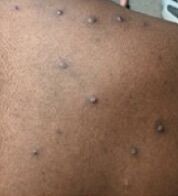Monkeypox continues to have disparate impact on Black men in Georgia
Published 9:00 am Thursday, August 25, 2022

- Photo credit: CDC, NHS England High Consequence Infectious Disease Network
ATLANTA— The disproportion of the monkeypox virus on Black men in Georgia is stark compared to outbreaks of the virus in other parts of the country.
Men continue to make up the majority of monkeypox cases nationwide. And while Black people make up only 14% of the country’s population, the number of reported monkeypox cases by race nationally appear to have been more or less around 30% for each race, Black, white, and Hispanic or Latino in recent weeks.
According to Aug. 24 data from the Georgia Department of Public Health, 98% of the state’s reported cases are among men and 79% are among Black people, who make up 31% of the state’s population.
Twelve percent of cases are among white people, and the age group 26-35 represents nearly half of the reported cases (approximately 45%) in Georgia.
Health officials say the virus can spread from person-to-person through direct contact with the infectious rash, scabs or bodily fluids. It can be spread by respiratory secretions during prolonged, face-to-face contact, or during intimate physical contact, such as kissing, cuddling or sex.
“What is currently known about monkeypox transmission indicates that sharing bedding or towels with someone who is infected with monkeypox would carry more risk than passing encounters with money or a door handle or other environmental surfaces,” according to a statement from the Georgia Department of Public Health.
The virus is not limited to the gay community, though more than 90% of those affected in the current global outbreak are gay, bisexual or other men who have sex with men, according to DPH; anyone who has been in close contact with someone who has monkeypox can be infected, according to health officials.
Larry Walker, executive director of THRIVE SS, an Atlanta-based support group for Black gay men living with HIV, suggests that the monkeypox virus is widely reported in his community due to frequent screenings often required of HIV positive people.
“I’m not surprised that we’re seeing many cases be discovered in our communities because we’re likely to be engaged in that type of surveillance,” Walker said. “If you’re living with HIV, you go to the doctor every three months, you get screened for other (sexually transmitted diseases) whereas typically, when you think about Black men or just men in general, they’re less likely to go to the doctor and less likely to have a relationship with health care.”
The demand for the vaccine in the LGBTQ community has increased in recent weeks as the number of monkeypox cases in Georgia increased by nearly 500 in a week.
“People are really trying to get the vaccine however they may,” Walker said Aug. 19. “We have a waiting list of hundreds of people (who) are still waiting to be connected to either Fulton, DeKalb or Gwinnett counties to get the vaccination.”
Georgia DPH reports that 16,467 Georgians have received the monkeypox vaccine as of Aug. 24, 95% of them men, but only 45% of people who identify as Black.
“Government entities must do better to prioritize reaching Black and Brown gay, bi+ and transgender men, as well as transgender women and non-binary individuals, especially those individuals living with HIV. Partnering with community organizations and sexual health clinics is paramount,” said Torrian L. Baskerville, Human Rights Campaign’s director of HIV & health equity. “We’ve seen historical and systemic discrimination when it comes to delivering effective prevention and treatment to these members of our community. As we have learned many times, a public health response that does not center equitable care and treatment is a failed response.”
Because the monkeypox vaccine requires two doses, supply is limited. GDPH has prioritized vaccines to people who may have been exposed to monkeypox, following guidance from the Centers for Disease Control and Prevention for administering the monkeypox vaccine, DPH stated.
Currently, to move forward with signing up for the monkeypox vaccine via the GDPH website, an affirmative response must be selected when asked:
– Have you had two or more sexual partners in the last 14 days who are MSM (men who have sex with men) or who have close, intimate, sexual contact with persons who are (MSM)?
– Are you 1) a man who has sex with men or 2) a person who regularly has close, intimate or sexual contact with persons who are MSM?
With symptoms lasting two to four weeks, the most notable sign of monkeypox is a rash, bumps or sores on the body, and more than 70% of people with monkeypox have reported a fever and/or tiredness or a feeling of sickness, according to the CDC. The virus can also cause flu-like symptoms such as headache, muscle aches and backache, swollen lymph nodes, chills, exhaustion, sore throat, nasal congestion and cough.
Health officials urge the public to protect themselves against monkeypox by avoiding skin-to-skin contact with someone with a rash that looks like monkeypox, and washing your hands often with soap and water or use an alcohol-based hand sanitizer.
On July 15, Georgia DPH reported that the state’s 93 reported monkeypox cases were among men living in metro Atlanta; however, DPH has declined to report or provide a county-by-county breakdown of reported monkeypox cases in the state.
Georgia has the fifth highest number of reported monkeypox cases, approximately 1,240 as of Aug. 24.
New York, California, Florida and Texas lead in the highest number of reported cases, and are also among the top states with large LGBTQ populations.
To schedule a monkeypox vaccine, visit dph.ga.gov/monkeypox and click on the Learn More tab under “Find a Vaccine and Register for an Appointment.” Or call the Vaccine Scheduling Resource Line at (888) 457-0186


